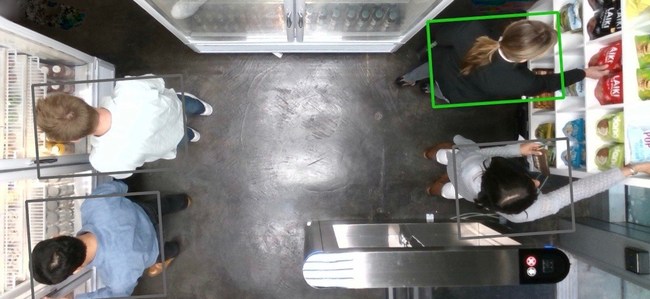Just eight months after Amazon made headlines for the launch of their San Francisco-based checkout-free grocery store, Amazon Go, a new competitor comes to the foggy city. Zippin, a Seattle, San Franciso-based startup, has opened a temporary concept store in the city’s SOMA neighborhood to showcase their artificial intelligence (AI) driven retail platform.
According to the company, US consumers waste an average of 37 billion hours a year standing in line and most of this time is spent waiting in retail checkout lines. Zippin’s patent-pending technology tackles this issue with AI, machine learning and visual cognition technology, which work together to create a seamless consumer experience. This technology, along with Zippin’s secure platform, can be incorporated into any retail space, which means that anyone can offer a checkout-free experience in their store.
In fact, the company claims that their integrated system, which uses a combination of overhead cameras and smart shelf sensors, produces the highest level of accuracy. This technology has been proven to work in crowded retail environments as well.
“Consumer frustration with checkout lines is driving a tidal wave of demand among retailers and real estate owners keen to provide a frictionless retail experience,” said Zippin CEO, Krishna Motukuri. “With annual sales of grocery stores, convenience stores and quick-serve restaurants totaling nearly $1.6 trillion in the US alone, we believe there is a sizeable market opportunity for us to pursue.”
This frustration with the retail space might be why many consumers are looking into online shopping as an alternative. However, Zippin’s CEO believes that brick-and-mortar stores still have the upper hand in the grocery sector.
“Despite the popularity of shopping online, brick and mortar retail still accounts for more than 90 percent of all purchases made in the US. With Zippin, traditional retailers can now compete against e-commerce companies, which until now have had the advantage of leveraging a host of key data about their customers,” said Motukuri.
The Zippin system works with their mobile Zippin app which can be downloaded by consumers through iTunes or Google Play. The app will work as the “key” or QR code for consumers and it would need to be scanned in order for a customer gain access to a store. Once inside, consumers will be tracked with overhead cameras (which do not use face recognition) while smart shelf sensors will monitor which products are picked up or put back.
The company’s San Francisco concept store is currently only available to consumers who receive a private invitation. However, Zippin will open this store to the general public in mid-September.
Zippin is one of the many startups trying to keep up with e-commerce and retail giant, Amazon. After the company’s acquisition of Whole Foods last year, the retailer has been seen introducing a variety of grocery and retail technologies and services such as same-day delivery and drone delivery. However, competitors were not going to back down without a fight, which is why startups such as Zippin are catching their eye. An example of a similar startup is AiFi which introduced a scalable checkout-free grocery shopping system in March. However, Amazon might have a harder time competing with an established company such as Microsoft, who is also working on developing their own version of autonomous checkout free technology.
As grocery technology progresses in the industry, consumers will likely have a new standard for the overall retail experience. Considering the amount of interest there is in AI and checkout-free technology, it looks like retail lines could soon be a thing of the past.












Join or login to leave a comment
JOIN LOGIN